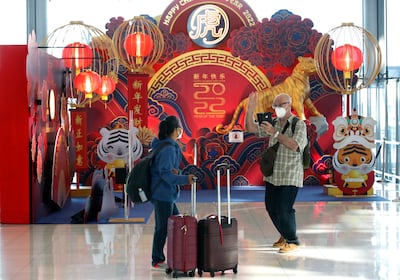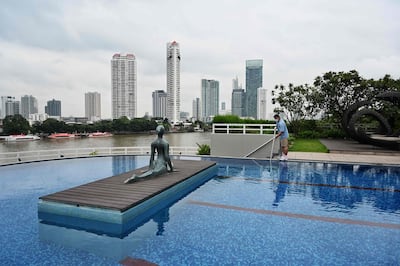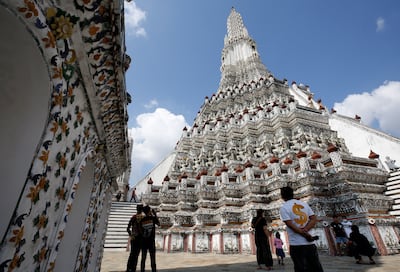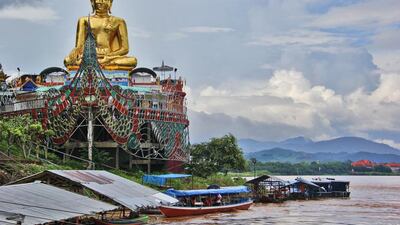Thailand has updated its Covid-19 travel rules, so that vaccinated visitors to the country no longer need to show a negative PCR test on arrival.
The country launched a new quarantine-free visa programme on February 1, allowing vaccinated travellers from any destination to visit. Tourists of any nationality can apply for quarantine-free entry into Thailand, provided they are fully vaccinated.
Visitors do still need to undergo Covid tests on their first and fifth days in the country, as part of the Test and Go scheme. Once they test negative, they are free to leave their hotel and travel freely throughout the country.

Thailand's Covid-19-hit tourism industry, which welcomed nearly 40 million visitors in the year before the pandemic, is welcoming the return of international travellers. If a trip filled with culture, idyllic beaches, island-hopping and an amazing culinary scene tempts you, here’s what you need to know before you go.
Who can travel to Thailand?
Travellers who have received a full dose of a Covid-19 vaccination can now fly to Thailand without quarantine.
The final dose of a vaccine must have been taken at least 14 days before arrival. Travellers between the ages of 12 and 17 travelling to Thailand unaccompanied must have received at least one dose of an approved vaccine at least 14 days before travelling to Thailand. Those travelling with parents are exempt from this requirement, as are those under the age of 12.
The new rules allow travel to any province in Thailand, not only those listed under the country's Sandbox scheme.
What do I need to get a quarantine-free visa for Thailand?
To qualify for a quarantine-free visa to visit Thailand, tourists need the following:
- Proof of a completed dose of an approved Covid-19 vaccination, taken at least 14 days before travel.
- Covid-19 insurance cover with a minimum limit of $20,000. This has been reduced from an initial requirement of $50,000.
- Proof of prepayment for one night of accommodation at a government-approved hotel, which should also include the expenses for two Covid-19 tests: a PCR test to be taken on day one and an antigen self-test on day five.
What vaccines are recognised for travel to Thailand?
Authorities are recognising all the major Covid-19 vaccinations, in line with the latest guidelines of the Thai government.
This includes Pfizer-BioNTech, Oxford-AstraZeneca, Covishield, Johnson & Johnson, Sinovac, SK Bioscience-AstraZeneca, Moderna and Sinopharm.
What do I need to do before flying to Thailand?
Travellers must apply for a Thailand Pass before heading there. This will generate a QR code that will be required for entering the country.
To get the pass, visitors must provide proof of vaccination. All travellers must also have an approved hotel booking for both their first night in Thailand (which should include an airport transfer).
Day one is the day of landing in Thailand, unless you arrive after 6pm, in which case you should count the following day as day one.
All travellers must download and install the MorChana application, and make sure it is on at all times. This must also be used to record the antigen test on day five.
Which airlines are flying from the UAE to Thailand?

Etihad Airways and Emirates are both flying to Thailand from the UAE, with a journey time of about six hours.
You can fly from Abu Dhabi to Bangkok with Etihad in economy class from Dh2,315 ($630). The national airline of the UAE also flies to Phuket.
From Dubai, Emirates' fares to Bangkok are from Dh2,395 in economy class and are slightly more expensive to Phuket. Thai Airways also operates from Bangkok to Dubai.
What restrictions are in place in Thailand?

Face masks are compulsory across the country and must be worn in indoor and outdoor public places and on public transport. If you do not wear a mask, you may have to pay a fine.
The Thai government also advises that you avoid unnecessary travel and crowded places, and scan the Thai Chana QR code where available.
Provinces across Thailand are colour-coded and each colour has its own level of restrictions. The categories range from blue, which has the least restrictions, to red, where there are rules and restrictions on dining in restaurants, gathering in groups, closures of shops and curfews.
Is Covid-19 still prevalent in Thailand?

Thailand recorded 25,752 new Covid-19 cases in the week leading up to April 1, according to data from Johns Hopkins University.
The country has rolled out a mass vaccination drive with a target of inoculating 70 per cent of the local population by 2022. Johns Hopkins University reports that the country has reached its self-imposed target, with more than 72 per cent of the population now fully vaccinated.
When’s the best time to travel to Thailand?

November to March tradition offers best weather for travel to Thailand as it's the end of the monsoon season, which means lush landscapes and pleasant temperatures.
July to October brings Thailand’s monsoons back to the country, which can mean anything from an afternoon shower to major flooding, making this low season for visitors.
– This article was first published on November 1, 2021

















